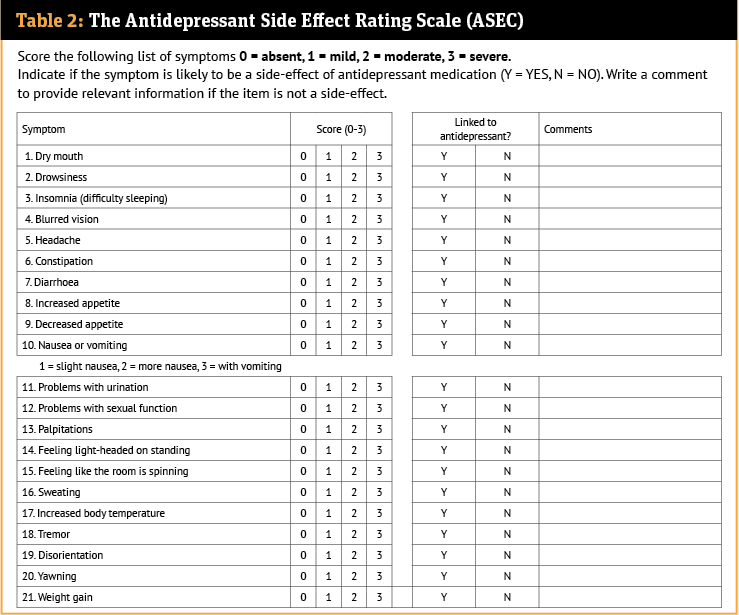3. Questions to ask during the consultation
When conducting a consultation, it is important to be mindful that all patients are different, so the style of consultation and the questions asked should be tailored to each individual patient.
Asking open questions gives the patient a chance to highlight any concerns they may have and offers them an opportunity to share their experiences so far.
- “Have you started taking the antidepressant medication?”
- “How are you getting on with this new medication?”
Based on the patient’s answers, more specific questions can be asked to explore their tolerance and response to the medication in more detail.
When exploring how well a patient is tolerating a new medication, the following types of questions can be helpful in starting the conversation:
- “Are you having any problems or do you have concerns about taking the new medication?”
If the answer is yes, you could continue with the following prompts:
- “Are you able to describe to me what these problems/concerns are and how they are impacting you?”
- “Are you experiencing any side-effects from this medication?”
If the patient reports that they are experiencing side-effects, additional follow-up questions can be asked to determine how severe they are and whether there has been any improvement:
- “Could you describe in more detail what these side-effects are and when they started?”
- “How severe or distressing are these side-effects or are they tolerable currently?”
- “Are you willing to keep going for another x days because these side-effects might lessen or disappear completely?”
The antidepressant side-effect rating scale recommended by the Royal College of Psychiatrists is a helpful aid (see Table 2).
It is important to remember that talking about mental health and exploring symptoms of depression may be upsetting or triggering for some patients. For this reason, before asking specific questions about a person’s response to their medication and how effective or ineffective it has been, it is important to confirm that they are comfortable discussing their mental health with you. You could do this by checking:
- “Is it okay if I ask some questions about your mental health to help both of us assess how effective your new medication is?”
- “Are you comfortable with this or would you prefer not to discuss it in today’s consultation?”
If the patient is comfortable discussing their mental health with you, the following type of question can be useful when trying to assess how effective their medication has been:
- “I understand this medication has been prescribed to treat depression. Have you noticed any change in mood since starting it?”
Some patients may struggle to describe their mood and whether there have been any changes. It may be appropriate to ask specific questions regarding some of the symptoms of depression (e.g. disorganised thinking, anhedonia).
It can also be helpful to ask the patient to score their mood to see if there has been any improvement by asking:
- “If you had to rate your mood on a scale of 1-10, how would you rate it now, with 10/10 being the best you have ever felt and 1/10 being the worst? What was the score before you started the medication?”
- “Some people with depression can experience symptoms such as low motivation, loss of pleasure in activities they previously enjoyed and muddled thinking or brain fog. Were you experiencing any of these symptoms before taking the medication? If so, have you noticed any improvement since starting the medication?”
Typically, it can take two to four weeks of treatment before an improvement in mood occurs, and it can take up to six weeks to assess fully the efficacy of a new antidepressant.
If a patient is not experiencing any improvement in their mood after a four-week trial of an antidepressant medication, they may need to be referred back to their GP for their dose to be optimised or for alternative medication options to be considered.
Different antidepressants have different minimum effective doses and it may be that the initial starting dose is not the most effective and further dose adjustment is needed. If patients have experienced some improvement in their mood after four weeks but symptoms of depression are not fully resolved, it may be appropriate to recommend that they continue the medication for another two weeks (if tolerating well) as it can take up to six weeks to fully assess their response.
During this initial phase of treatment, there is an increased risk that the patient may experience suicidal ideation and other mood changes. This is because antidepressants can increase both energy and motivation levels, which start to rise prior to the depression beginning to lift. There is then an increased risk that the person may have more energy and motivation to act on suicidal intent before their mood starts to improve.
This risk is particularly high in young people under the age of 25 years, but it can occur in any individual newly starting an antidepressant medication. If a patient reports a deterioration in their mood on starting an antidepressant, it is important that they are urgently referred back to their GP for further review.
If during a consultation any patient expresses suicidal ideation or discloses thoughts or plans to harm themselves, it is essential that these risks are highlighted to the patient’s GP immediately. If a patient is in crisis and has active plans to harm themselves or end their life, they should be referred to the local urgent care service.
Urgent mental health support can also be sought by calling 111 and selecting option 2. If you are concerned that a patient’s life is in danger, support can be sought via 999 or A&E.
Reflection exercise
The NICE guideline ‘Depression in adults: treatment and management’ (NG222), published in 2022 (nice.org.uk/guidance/ng222) can be used to refresh clinical knowledge about antidepressants.

